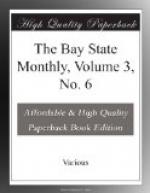Yet with all the varied charms of foreign life, passed in the most cultivated and refined social circles of Europe, Kate Field never forgot that she was an American, and patriotism grew to be a passion with her. She became a student of English and American politics, and her revelations of the ponderous machinery of the British Parliament, in a series of strong and brilliant press letters, now collected into the little volume called “Hap-Hazzard,” was as fine and impressive in its way as is her dramatic criticism or literary papers. All this, perhaps, had paved the way for her to enter into a close and comprehensive study of the subject which she is now so ably discussing in her notable lectures on the social and the political crimes of Utah. The profound and serious attention which she is now giving to this problem stamps her lectures as among the most potent political influences of the time. Miss Field’s discussion of Mormonism is one of those events which seem pre-determined by the law of the unconscious, and which seem to choose the individual rather than to be chosen by him. In the summer of 1883, by way of a change from continental travel, Miss Field determined to hitch her wagon to a star and journey westward. She lingered for a month in Denver where she received distinguished social attention and where, by special request, she gave her lecture on an “Evening with Dickens” and her charming “Musical Monologue.” Of this Dickens’ lecture a western journal said:—




